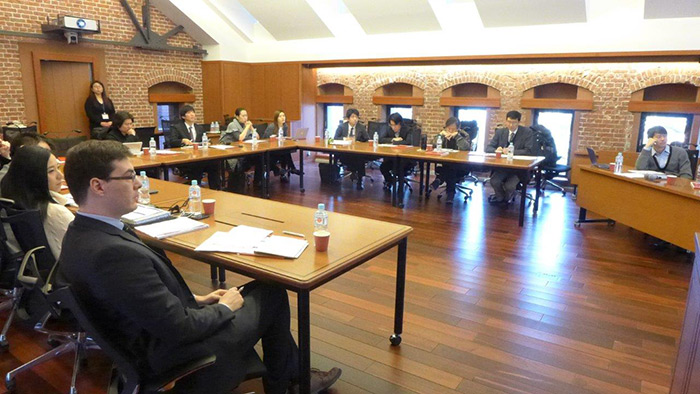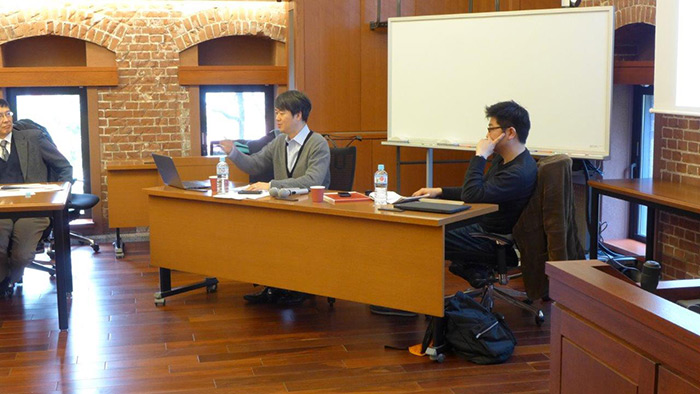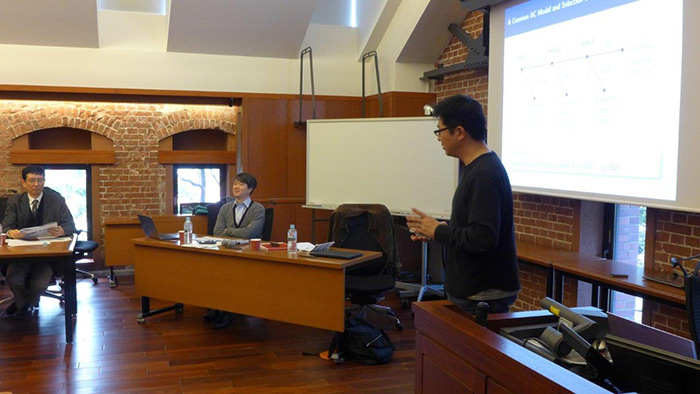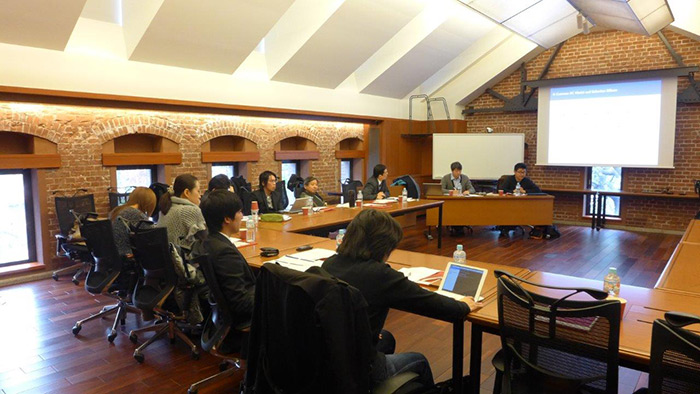SSU Forum with Professor Shuhei Kurizaki and Professor Taehee Whang
| Date: | Wednesday, January 8, 2014, 10:30-12:00 |
|---|---|
| Venue: | Conference Room, 3rd Floor, Ito International Research Center |
| Subject: | “International Crises and Political Costs: Structural Estimation of the Audience Cost Model” |
| Lecture: |
Shuhei Kurizaki (Associate Professor of School of Political Science and Economics, Waseda University) Taehee Whang (Associate Professor of Division of International Studies, Korea University) |
| Language: | English |
| Hosted by: | Security Studies Unit, Policy Alternatives Research Institute, the University of Tokyo |
The Security Studies Unit of the PARI was delighted to host a talk delivered by Professor Shuhei Kurizaki of the School of Political Science and Economics, Waseda University, and Professor Taehee Whang of the Division of International Studies, Korea University. The talk was chaired by Professor Keisuke Iida of the University of Tokyo, senior member of the SSU.

Professor Kurizaki and Professor Whang illustrated a paper entitled “Detecting Audience Costs in International Disputes”, which emerges out of a long term cooperation and a shared interest on the subject of audience costs in the context of decision making process quantitative analysis in international political crises. The proposed paper starts from considering the existing literature on the point of audience costs (ACs) as first theorised for international political decisions by James Fearon in 19941. The debate around ACs has developed in several directions with attempts to tackle several descriptive and explanatory gaps, which pertain to the theoretical domain (absence of consensus on microfoundations)2 as well as to the empirical domain (conclusive empirical evidence has not been presented yet)3.

Kurizaki and Whang’s study proposes the establishment of an empirical foundation of the AC model by attempting to demonstrate the existence of ACs using observational data. It also determines the correlation of AC with the degree of democraticness of the states involved, and the magnitude of AC, which is found to be comparable to the war costs. The paper illustrates how the effect of AC in relation to the coercion of the political adversary is both statistically and substantively significant. Finally, it argues that the effect of AC on belief-updating is statistically significant, but not sizable4.

The successive Q&A session has developed largely with a focus on the methodological assumptions of the proposed research, and further on the compatibility of the data set used for the empirical part (international political crises in the 1919-1939 period) with possible broader claims including current and future international political disputes. The authors have clarified that in many ways their project has been developing as a heuristic tool and as the exploration of a topic which is still largely uncharted. While it does not contain immediate explanatory ambitions of real political situations, left alone of causal mechanisms on the decision of going to war, the paper tries to clarify the relations between different variables by proposing a more comprehensive model than those to be found in the existing literature.

Footnotes
- In a paper entitled "Domestic Political Audiences and the Escalation of International Disputes" (http://www.jstor.org/stable/2944796) James Fearon defines audience costs as the real or prospected negative variation in terms of approval rating which affects a leadership as a consequence of decisions taken during an international crisis. In the "war of nerves" which characterises an international environment on the brink of war, real or perceived audience costs with relation to various possible courses of action (back off, attack, escalate) can determine which option a government will eventually choose.
- “Microfoundations” refers here to the development of a mathematical description of audience costs’ change in relation to a number of variables. Such description is grounded in microeconomics, hence the name.
- Alongside a better macroeconomic clarification of how audience costs vary in relation to several variables, a high level of confidence in the scientific validity of the very concept of ACs can be achieved only by some kind of experimental verification. The explanatory gaps researchers intend to fill are therefore not only of theoretical-mathematical nature, but also concern the way in which such theoretical model can, when applied to data from real situations, provide explanation and prediction.
- “Sizable” means that the model displays some correlation between ACs and actual decisions taken by political leaders, in excess of standard (statistical) deviation, though remaining unsatisfactorily small to operate as an explanatory device.
-
Associate Professor of School of Political Science and Economics, Waseda University
-
Associate Professor of Division of International Studies, Korea University
